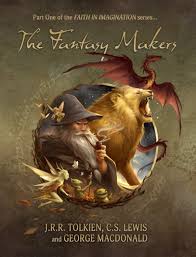Faith In Imagination:
The Fantasy Makers
A Documentary
–Review by Teri Hyrkas
One definition of the word “flight” is: a grouping of similar items, such as a flight of stairs or a flight of geese. In the documentary The Fantasy Makers,(Gateway Films/Vision Video, 2018), we have been given a flight of authors, all of whom are identified with books of fantasy. Fantasy can be a controversial category of literature for some Christians. There are Christians who consider any fiction, and fantasy in particular, to be deleterious to one’s faith. “The Fantasy Makers” documentary provides a strong argument demonstrating that rather than harming one’s faith in God, the imagination can in fact draw one toward God.
“The Fantasy Makers” is a Canadian film which is brimming with information about three writers, all Christians, who have authored some of the best known and best-loved fantasy volumes of the last century. Two of the authors’ names are immediately recognizable: J.R.R. Tolkien and C.S. Lewis, authors of “The Lord of the Rings” and “The Chronicles of Narnia,” respectively. The third and earliest author, George MacDonald, is not as well known. MacDonald was a 19th-century Scottish minister and writer whose books greatly influenced both Tolkien and Lewis. The first part of “The Fantasy Makers” presents a brief history of MacDonald’s life, and a look at his work. One of the many intriguing pieces of information offered in this section of the documentary is this: It is MacDonald who “writes the first-ever work of fantasy of the modern era…,” a book that was hugely popular … the Harry Potter of its day.” This book by MacDonald is called Phantastes. It is a fairytale about a young man who finds his way into an alternate universe where he learns about the role of medieval knights and their code of chivalry. Phantastes is still in print today.
Early in the film we are made aware of the conflict that exists in various Christian circles with works of fantasy. English academic, poet and Anglican priest, Malcolm Guite, points out that some religious faiths have “been very suspicious of the way images, and particularly myths and legends and stories, might possibly delude us. But it is a remarkable thing that some of the very best, purely imaginative literature…has actually been written by Christians.” Guite suggests that Christians “might learn to make friends with the imagination and to realize that the imagination is God given….”
Another contributor to the documentary, Dr. Amy H. Sturgis, author, speaker and scholar of science fiction/fantasy studies and Native American studies, notes that, “Imagination is a way of thinking. It is not irrational or whimsical, divorced from rationality or reasonableness. It is a way we have of deeply examining thought.”
“The Fantasy Makers” director, Andrew Wall, chose fourteen interview subjects for his documentary. These individuals range widely across the spectrum of people considered experts in fantasy literature. His candidates include Malcolm Guite and Dr. Amy Sturgis, mentioned previously. Another is Derek W. White, a Methodist pastor and gamer known as the Geek Preacher. White is a member of the Story Squad at PreachTheStory, and acts as the researcher and curator of the column, “The Digital Feast.” All of the interview participants offer insightful and pertinent information on the three authors featured in “The Fantasy Makers,” and they also address the attributes, history, and challenges of fantasy literature.
Filmed partly on location in the province of Manitoba, Canada, the interviews take place in libraries, book-filled offices, and even in the sanctuary of an old church. All of these settings add an aura of beauty to the film. In addition, actors in period clothing represent the three featured authors at various stages in their lives. The costumes and other furnishings, such as antique fountain pens and the actual desks of Lewis and Tolkien, help to give the documentary an authentic visual time-stamp.
One of the surprising revelations of “The Fantasy Makers” was an observation by two contributors, Malcolm Guite, and Kirstin Jeffrey Johnson. They believe England experienced a time when the English as a people lost their story — their identity. After the Invasion of Normandy in 1066, says Malcolm Guite, the English abandoned the Arthurian legends and other myths of their past and took on stories of France, Rome, and Greece. George MacDonald, among others, recognized that this was a vast cultural problem and 1858 he wrote “Phantastes” in response to the situation. According to Johnson, it was because the popular fantasy story told of knights and chivalry in ancient England that the English became acquainted with and grew interested in regaining their own story. Readers’ imaginations had been awakened by a fantasy story, but they moved from fantasy to reality and began pursuing their English identity. As Leonard Sweet says in his video from Tabor College (Tabor E-lab #6, 2014) called Bring Back the Table, “Identity requires narrative form.” Such is the power of story.
The Fantasy Makers is an excellent documentary which discloses many captivating aspects of the work and lives of George MacDonald, J.R.R. Tolkien, and C.S. Lewis, and it also provides a beneficial look at the vital connection between imagination and faith. The DVD of “The Fantasy Makers” is available for purchase from Amazon, or if you have Amazon Prime, you can watch it on Amazon Prime Video free of charge. Whichever way you chose to see it, prepare to be delighted and surprised by this “flight of fantasy.”
.
.

